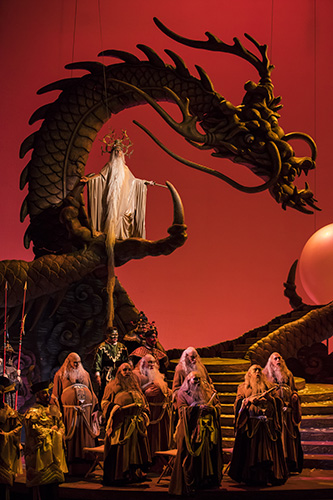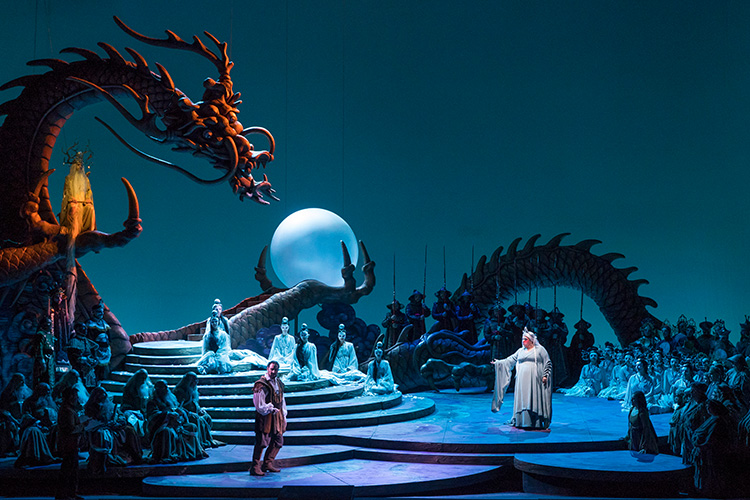March 06, 2019
What You Need and Want to Know About TURANDOT
Giacomo Puccini’s glorious final opera, Turandot, opens December 5 in an extravagant production not previously seen on Lyric’s stage. It showcases the composer’s magnificent melodic outpourings and reveals Puccini at his peak as a creator of exotically beautiful orchestration. Turandot is one of opera’s biggest blockbusters. The plot unfolds to music of extraordinary brilliance, including “Nessun dorma,” the most popular of all Italian tenor arias.

Here are some things you may want to know as you anticipate your Turandot experience:
- This is truly Grand Opera. The scale and spectacle of Turandot is genuinely dazzling...and also accessible.
- Pomp and pageantry in ancient China as imagined by the brilliant Italian composer Giacomo Puccini (1858-1924).
- Personal turmoil, secret suffering, and impassioned determination drive the plot, with revelations of ancestral trauma and unrequited love.
- “Nessun dorma” — probably the world’s most famous tenor aria — comes in the final act of Turandot. Worth the wait!
- Lyric’s best-in-class cast — American soprano and Ryan Opera Center alumna Amber Wagner (Turandot), Italian tenor Stefano La Colla* (Calaf), Italian soprano Maria Agresta* (Liù – December), American soprano & Chicago native Janai Brugger* (Liù – January), Italian bass Andrea Silvestrelli (Timur), American baritone Zachary Nelson (Ping), Filipino-American tenor and Ryan Opera Center alumnus Rodell Rosel (Pang), and American tenor Keith Jameson (Pong).
*Lyric debuts

- Elevator-speech plot summary: An icy princess is terrified of love. A mysterious prince solves three riddles and melts her heart while breaking another’s. Love triumphs, but it’s complicated.
- The story: a vivid fantasy of long-ago China, where the imperious Princess Turandot poses three riddles to any prince who dares to court her, and commands the death of all who fail. When an unknown prince triumphs, the prospect of marriage strikes terror in Turandot’s heart. Ever the gentleman, he offers her an out — but only if she can guess his name. The slave Liù loves Prince Calaf and serves his father Timur, but fiercely guards the secret of his name. What will it take to melt Turandot’s resistance?
- Story origin: The tale of Turandot derives from the Persian story collection, The Book of One Thousand and One Days, translated into French by François Pétis de la Croix.
- Give the gift of an unforgettable opera experience this holiday season — to your loved ones and yourself! The shared memories will last long after the final curtain.
- Turandot is perfect to share with nearly all ages. Projected English texts above the stage tell the story, and the opulent costumes and sets, along with the melodic sweep of the musical storytelling, will keep everyone’s attention engaged.
- Most family-friendly piece this season — call 312-827-5600 to order specially priced $20-$50 seats for children.
- Giacomo Puccini’s earlier big-hit operas include La Bohème, Tosca, and Madama Butterfly, along with La fanciulla del West, Manon Lescaut, and his trio of one-acts: Il tabarro, Suor Angelica, and Gianni Schicchi.
- Lyric Opera Orchestra conducted by Sir Andrew Davis, Lyric’s music director who’s celebrating the 30th anniversary of his Lyric debut this season; and by Robert Tweten (January 27).
- Expanded 84-member Lyric Opera Chorus prepared by Michael Black, Lyric’s chorus master.
- New-to-Chicago Production directed by Rob Kearley* with lighting by Chris Maravich. August Tye is movement director.
*Lyric debuts - 10 Performances including four matinees Tuesday, December 5-17 and Saturday, January 10-27 at Lyric Opera House, 20 N. Wacker Dr., Chicago.
- Performances start promptly at 2:00pm and 7:30pm, and doors open to the Rice Grand Foyer and Opera Club two hours before curtain.
- 30-minute preview talk about the opera before every performance — Come to the theater one hour before the curtain rises for a free pre-opera talk about the composer, the themes within the music and story, and overall production.
- Turandot lasts approximately 3 hours including two 25-minute intermissions.
- Sung in Italian with projected English translations.
- How do you say it? Scholars and singers have debated whether to pronounce the final ‘t’ or not throughout its performance history. Either way, you’re right. In the current production at Lyric, you'll hear it as "Too-rahn-doht," with the final 't' slightly pronounced.
- Puccini researched Chinese music and incorporated an authentic folk melody into his score, “Mo Li Hua” (“Jasmine Flower”), which is sung by the children’s chorus in Act One. A Chinese music box Puccini received from a former Italian diplomat introduced this and other authentic melodies to the composer.
- The composer died before finishing the final act of Turandot. Composer Franco Alfano finished the score, which had its world premiere in 1926 at La Scala in Milan, 17 months after Puccini’s death. At the premiere, conductor Arturo Toscanini turned to the audience during the final act and said, “Here the master laid down his pen.”
- Bet you didn’t know...the composer’s full name was Giacomo Antonio Domenico Michele Secondo Maria Puccini.
- Possibly surprising trivia about the composer: Puccini loved fast boats, fast cars, playing poker, duck hunting, and women…not necessarily in that order.

